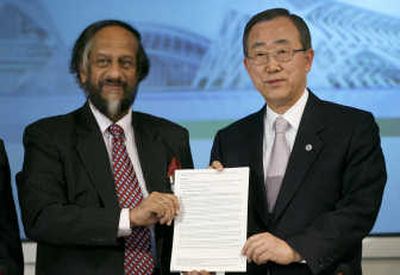U.N. urges fast action on warming

As concentrations of greenhouse gases in the atmosphere accelerate ahead of scientists’ projections, global warming is unequivocally under way, with potentially “abrupt or irreversible” effects looming, a Nobel Prize-winning United Nations panel on climate change reported Saturday.
The world still has time to avoid the most severe effects of climate change, however, if it can rapidly deploy existing and soon-expected new technology to cut carbon emissions, something that probably would require setting a price on carbon emissions to be effective, the Synthesis Report’s authors said.
Without such action, “unmitigated climate change would, in the long term, be likely to exceed the capacity of natural, managed and human systems to adapt,” the report warns.
The document, a synopsis of three climate reports released earlier this year by the thousands of scientists who make up the U.N. Intergovernmental Panel on Climate Change, is intended as a succinct policy guide on the risks of climate change and the possible means to mitigate or adapt to it.
Policymakers, set to meet in December in Bali, Indonesia, are expected to use the report as their baseline to begin the tortuous process of trying to replace the expiring and largely ineffective Kyoto Protocol on limiting greenhouse gas emissions with a new and more effective world plan to slow climate change.
“We cannot afford to leave Bali without such a breakthrough,” U.N. Secretary-General Ban Ki-moon said in Valencia, Spain, after the report’s release Saturday. The potential consequences of quickening climate change are “so severe and so sweeping that only urgent global action will do,” he said. He called the problem “the defining challenge of our age.”
The report paints a grim picture of what the world might look like if policymakers – and in particular major polluters such as the United States, China and India – fail to act quickly to begin cutting greenhouse gas emissions.
“This report will have an incredible political impact,” said Yvo de Boer, the U.N.’s top climate change official. “It’s a signal that politicians cannot afford to ignore.”
Without action, rises in sea level will accelerate, forcing millions of people out of low-lying coastal regions. Worsening droughts, severe storms and water shortages will affect many regions of the world, and changing conditions are likely to put at least 20 to 30 percent of the world’s species – including virtually all its coral reefs – on the route to extinction, the report said.
Levels of greenhouse gases in the atmosphere already are the highest in 650,000 years, the report said, and emissions are expected to grow 25 to 90 percent by 2030, even taking into account current efforts to cut them.
That suggests that if accelerating levels of emissions aren’t cut soon, the world could see catastrophic changes, including the complete melting of Greenland’s ice sheet and a worldwide sea level rise of 20 feet, within a few hundred years. Less dramatic effects would be widely noticeable by 2030 or even 2020, the report said.
Most at risk are the Arctic, which is on the path to being ice-free in late summer; sub-Saharan Africa, with little money or ability to adapt to predicted changes; low-lying small islands, which face inundation, and the huge river deltas of Asia and Africa, where tens of millions of people in low-lying areas face rising seas, storm surges, river flooding and risk becoming climate refugees, the report said.
Already, “there is high confidence that neither adaptation nor mitigation alone can avoid all climate change impacts,” the report said, noting that some changes, such as the melting of glaciers, are happening much faster than scientific predictions.
Lowering worldwide greenhouse gas emissions can be done at moderate cost but only if it is done quickly, the report said. That would require, among other things, quickly reorienting decisions on $20 trillion worth of energy infrastructure investment planned between now and 2030, and rapidly testing as many technologies to cut carbon emissions as possible.
Establishing a cost for emitting greenhouse gases – a “price of carbon” – could take advantage of market mechanisms to help drive emissions cuts, the report said, noting that the costs of inaction are likely to be much higher than the costs of acting now.
Rajendra Pachauri, chairman of the climate panel, which shared the Nobel Peace Prize with Al Gore earlier this year, urged “a new ethic by which every human being realizes the importance of the challenge we are facing and starts to take action through changes in lifestyle and attitude.”
The United States opted out of Kyoto in 2001, arguing that the science was unproven and that the burden of mandatory emission cuts was unfair since it excluded fast-growing China and India.
Chief U.S. delegate Sharon Hays said doubts have been dispelled. “What’s changed since 2001 is the scientific certainty that this is happening,” she said in a conference call late Friday. She did not indicate that Washington would abandon its policy of voluntary emission cuts.